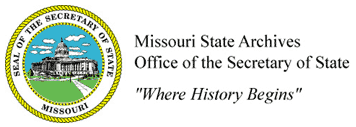Naturalization Records, 1816 - 1955
What are Naturalization Records?
Naturalization records play an important role in understanding the history of immigration in Missouri. Naturalization is the process by which a person who immigrates to the United States becomes an American citizen. Congress passed the first naturalization law in 1790. From that time through the early 20th century, immigrants could file naturalization papers in any court of record. County courts tended to be most convenient, and in Missouri these courts included circuit courts, chancery courts, probate courts, and common pleas courts. There was a two-part filing process, but the process did not have to take place in the same court. All Europeans residing in the Louisiana Territory (Missouri) at the time of the 1803 Purchase were automatically granted United States citizenship rights and privileges.
After living in the United States for two years, an immigrant could file the original "first papers," or declaration of intent (this requirement ended in 1952). After another three years of residence, the immigrant could file the petition for naturalization, or "second, or final papers". There are several exceptions to the general five-year rule, however:
-
Wives and minor children of naturalized men were granted derivative citizenship. From 1790 to 1922, wives of naturalized men or women who married U.S. citizens automatically became citizens themselves. From 1790 to 1940, children under the age of 21 became automatic citizens upon the naturalization of their father. Names and biographical information about wives and children are rarely included in declarations or petitions filed before 1906.
-
From 1824 to 1906, immigrants who were minors and had lived in the United States for five years prior to their 23rd birthday could simultaneously file the declaration of intent and petition for naturalization.
-
Special consideration was given to veterans. An 1862 law allowed, after one year of residence, an honorably discharged Federal Army veteran of any war to file a petition for naturalization; the requirement for an original declaration of intent was waived. An 1894 law extended this to veterans of the Navy and Marine Corps. Laws enacted between 1919 and 1952 included preferential treatment provisions for war veterans.
Before 1906, naturalization took place in local, state, or federal courts. There was no uniform system of maintaining naturalization records. After the Bureau of Immigration and Naturalization was established in September 1906, local courts were encouraged to relinquish their naturalization jurisdiction to federal courts. The post-1906 records were standardized. There are some exceptions, but in general, post-1906 records are uniform in appearance and include the biographical data of the applicant and that of spouse and children.
Naturalization Records Database
The Naturalization Records Project at the Missouri State Archives


Beginning in November 2003, volunteers from the St. Louis Genealogical Society, in a collaborative effort with the Missouri State Archives and the St. Louis City Circuit Court, sorted three partially-complete sets of naturalization index cards with citations to corresponding naturalization record books of the St. Louis Circuit Court. The Society then compiled information from the records into a searchable database of 93,104 entries, representing immigrant persons who filed for naturalization in the St. Louis court system from 1816 through September 1906.
Simultaneously, the Missouri State Archives’ eVolunteers transcribed naturalization data from various county record books and from Supreme Court of Missouri record books to produce a database of immigration information. This portion of the project primarily consists of records located in counties that kept separate naturalization books or separate indexes to naturalizations located within the record books. Many counties only recorded naturalizations within the court record book and no separate index exists.
Included in the Naturalization Records Database
Some counties allowed for the filing of copies of their paperwork from other courts, including federal courts after 1906. Additionally, courts will receive copies of naturalizations that were cancelled by the federal government.
NOTE: The below lists of indexed counties will not be complete for any county, since they are only indexing specific naturalization books. Only a few counties, including St. Louis City, have naturalization indexes for the all the records within the circuit court. Additional records for the county can show up in the probate courts or in the appellate courts.
Indexed
- Andrew (1869-1904)
- Bates (1904-1927)
- Bollinger (1909-1925)
- Buchanan (1839-1921)
- Butler (1903-1923)
- Cape Girardeau (1834-1932
- Carroll (1843-1907)
- Cedar (1860-1869, only 5 names)
- Chariton (1820-1902)
- Clark (1884-1886)
- Clinton (1885-1912)
- Cole (1868-1922)
- Cooper (1824-1905)
- Franklin (1840-1954)
- Gasconade (1822-1949)
- Greene (1868-1906)
- Howard (1821-1905)
- Iron (1860-1906)
- Knox (1845-1906)
- Lewis (1838-1902)
- Macon (1907-1953)
- Miller (1909-1929)
- Moniteau (1847-1902)
- Perry (1893-1950)
- Platte (1846-1926)
- Ray (1840-1906)
- Shelby (1835-1925)
- St. Charles (1819-1927)
- St. Louis City (1816-1906) *Includes St. Louis County until 1876
- Ste. Genevieve (1888-1930)
- Supreme Court of Missouri (1845-1890)
- Court of Appeals – Eastern District, St. Louis (1876-1906)
Additional Resources
County Records on Microfilm, Missouri State Archives - https://www.sos.mo.gov/archives/resources/county/croll
View the microfilm listing for each county to determine what court record books might exist for a county that have not been indexed for naturalizations.
National Archives at Kansas City - https://www.archives.gov/kansas-city/finding-aids/subject-list.html#naturalization
The National Archives at Kansas City holds Federal Circuit Court records, including naturalizations for Iowa, Kansas, Missouri, Nebraska, North Dakota and South Dakota. These Records will exist for the pre-1906 and post-1906 naturalization era’s but the exact dates vary by federal circuit.
Additionally, the National Archives at Kansas City holds the Alien Case Files for the entire country, except those from the districts in San Francisco, Honolulu, Reno and Guam. These Records date from 1944 and are eligible to be transferred to the National Archives 100 years after the immigrant’s year of birth.